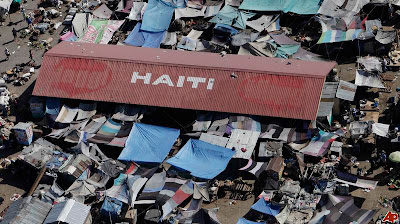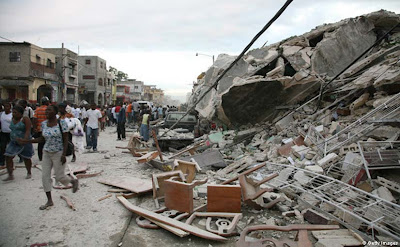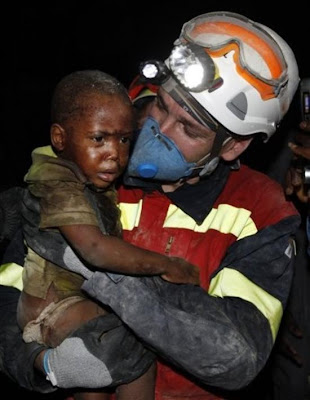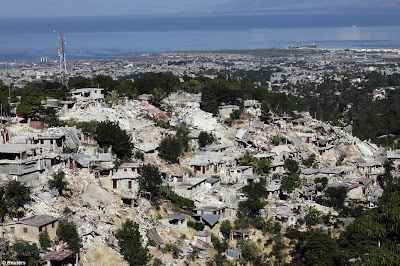
Up to 100,000 people may have died in the Haiti earthquake, the Pan American Health Organisation has said, as the UN launches an appeal for more than $550m (£337m) in aid."A variety of sources are estimating the numbers [at] between 50,000 and 100,000," said Jon Andrus of PAHO, the Americas arm of the World Health Organisation.
Barack Obama said the US would do everything it could to get the country back on its feet. "The scale of the devastation is extraordinary ... and the losses are heartbreaking," he said at the White House.
In Britain, the Disasters Emergency Committee has launched an appeal for aid. The British Red Cross said £1m was raised in the first 36 hours of its appeal.Initial estimates spoke of 45,000 to 50,000 deaths, and the sharp rise comes as peacekeepers in Haiti warn that security has become an urgent priority amid fears of a breakdown in order.
UN troops patrolling the capital said there was rising anger that aid had not been distributed quickly. The Brazilian military advised that aid convoys should add security to guard against looting.
"Unfortunately they're slowly getting more angry and impatient," said David Wimhurst, spokesman for the Brazilian-led UN peacekeeping mission.
"I fear … we're all aware that the situation is getting more tense as the poorest people who need so much are waiting for deliveries. I think tempers might be frayed."
Fevil Dubien, an aid worker, said some people were almost fighting over the water that he handed out from a truck in a northern Port-au-Prince neighbourhood.
Security was the biggest problem, Delfin Antonio Rodriguez, the rescue commander from the neighbouring Dominican Republic, told the AFP news agency. "Yesterday they tried to hijack some of our trucks. Today we were barely able to work in some places because of that."
The UN World Food Programme partly retracted a statement that looters had raided one of its warehouses containing 15,000 tonnes of food aid. In the new statement it said 6,000 tonnes of food remained in the building. A spokesperson said looting was not unusual in disaster situations when people were without the most basic supplies such as water.
The UN said it would launch a flash appeal this afternoon in New York for $550m in aid. A flash appeal is a way of structuring a co-ordinated humanitarian response. The former US president Bill Clinton said he would try to model a disaster assistance fund along the same lines he and former president George Bush Sr pursued for victims of the Asian tsunami. Barack Obama has asked Clinton, a UN special envoy to Haiti, to work with George Bush, the previous president, on a fundraising effort.
Hundreds of US troops and an aircraft carrier arrived in Port-au-Prince, raising hope that the situation would improve in the coming hours. "We have much more support on the way," said the US commander in the capital, Lieutenant General Ken Keen. "Our priority is getting relief out to the needy people, to mitigate the suffering that the Haitian people are experiencing right now."
The US aircraft carrier Carl Vinson arrived off Haiti's shores overnight with 19 helicopters. It started flights from its deck this morning.
The carrier has water purifying equipment and three surgical operating rooms, and can do medical evacuations as well as ferrying supplies and people to and from land.
The arrivals added to more than 300 military personnel who had already landed in Haiti. The 82nd Airborne was sending another 800 troops and aiming for a full brigade of 3,500 on the ground by the end of the weekend.
Jan Egerland, a former UN humanitarian chief, said he expected the arrival of aid to speed up. "We are in a very classic development. Days three, four and five are the most frustrating. Everybody knows that the whole world is mobilising and everyone has heard the promises. But it takes time to reach the beneficiaries. The infrastructure has either gone or totally clogged up," he told the BBC.
He said the inability of the Haitian government to direct relief operations and the death of the head of the UN mission in the country meant the US was effectively in charge of the situation.
The small airport in Port-au-Prince has struggled to cope with the stream of aid flights. Some have been turned away and little of the aid that has landed has arrived in the most needy areas.Bodies lay all around the hilly city, with people covering their mouths and noses with cloth to block out the smell. Corpses were piled on pickup trucks and delivered to the general hospital in Port-au-Prince, where the hospital director, Guy LaRoche, estimated there were 1,500 bodies piled outside the morgue.
More than 48 hours after the 7.0 magnitude earthquake struck, people clamoured for food and water and continued digging for relatives missing under the rubble. "We need food. The people are suffering. My neighbours and friends are suffering," said Sylvain Angerlotte, 22. "We don't have money. We don't have nothing to eat. We need pure water."
Aid workers warned that time was running out for the thousands still trapped in the rubble. One described his frustration at hearing the cries of trapped people but being unable to help them because of a lack of heavy machinery.
Rezene Tesfamariam, the Haiti director of charity Plan International, said people were using their bare hands or basic tools such as shovels and pick-axes to dig for their loved ones."There are people still alive underneath [rubble], you can hear them crying for help, but time is running out. It is beyond the means of individuals to reach them. They are trying to move concrete with their hands. What is desperately needed is proper machinery and equipment to lift the rubble."Tesfamariam said vehicles and equipment were urgently needed to remove the tens of thousands of bodies."I have been travelling round the city to find where we can provide assistance and I see dead bodies lying in the street everywhere."


















_20100113090246_640_480.JPG)




















No comments:
Post a Comment